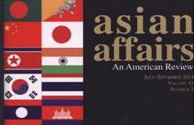
"Peacebuilding in Thailand’s Deep South and in Myanmar/Burma: the dynamic roles of Muslim minorities in conflict societies"
Srisompob Jitpiromsri, Md Mahbubul Haque & Paul Chambers
Abstract
There are few if any comparative studies of Thailand’s Deep South and Burma/Myanmar’s Rohingya crisis. Both cases are intriguing as they have similar characteristics, while nuanced by distinctive contexts and political consequences. In this article, the comparative analysis of crisis issues in the two countries concentrates on history, policy responses of governments, and peace processes. Burma/Myanmar and Thailand are Buddhist majority countries with different approaches of national integration. Based on a long history of independence, Malay Muslims of Thailand’s Deep South have always been disturbed by intensive assimilation policies, but their right to Thai citizenship has never been legally compromised. On the contrary, Rohingya people have been excluded from Burma/Myanmar’s national integration. The Thai state uses both violence and persuasion, but the peace process tends to integrate into the hierarchy and power of military domination. On the other hand, Burma/Myanmar’s conflict management is highly suppressive and exclusive. Thailand’s southern peacebuilding involves expanding state-building and illiberal peace, while Burma/Myanmar’s conflict management policy in Rakhine State is much higher on the scale of authoritarian “peace.”
Keywords: Peacebuilding, state-building, counterinsurgency, Malay Muslims, Rohingya
References : Asian Affairs: An American Review
Asst.Prof.Dr.Srisompob Jitpiromsri
Center for Conflict Studies and Cultural Diversity (CSCD) Institute for Peace Studies, Prince of Songkla University
งานศึกษาเปรียบเทียบระหว่างสถานการณ์ในจังหวัดชายแดนภาคใต้ของไทยกับวิกฤติโรฮิงยาของพม่า/เมียนม่ามีอยู่ไม่มากนักในปัจจุบัน แต่ทั้งสองกรณีมีความน่าสนใจเนื่องจากมีลักษณะร่วมกันหลายประการ ในขณะเดียวกันก็แตกต่างกันในลักษณะพิเศษของบริบทและผลที่ตามมา ในงานชิ้นนี้ การวิเคราะห์เปรียบเทียบประเด็นวิกฤติของทั้งสองประเทศมีจุดเน้นที่ประวัติศาสตร์ การตอบสนองทางนโยบายของรัฐบาลและกระบวนการสันติภาพ พม่า/เมียนม่าและประเทศไทยต่างเป็นประเทศที่คนส่วนข้างมากเป็นชาวพุทธและมีวิถีการสร้างบูรณาการแห่งชาติที่แตกต่างกัน จากการที่มีพื้นฐานของความเป็นอิสระมายาวนานในประวัติศาสตร์ ชาวมลายูมุสลิมในจังหวัดชายแดนภาคใต้ของประเทศไทยมักจะไม่พอใจกับนโยบายการผสมกลมกลืนที่เข้มข้น แต่สิทธิความเป็นพลเมืองไทยของพวกเขาก็ไม่เคยถูกปฏิเสธหรือผ่อนปรนในทางนิตินัยจากรัฐไทย (แม้จะรู้สึกเหมือนกับเป็นพลเมืองชั้นสอง) ตรงกันข้าม ชาวโรฮิงยาถูกตัดออกจากการสร้างบูรณาการแห่งชาติของพม่า/เมียนม่า ฝ่ายรัฐไทยใช้ทั้งความรุนแรงและการโน้มน้าวจูงใจแต่กระบวนการสันติภาพก็มีแนวโน้มที่จะถูกบูรณาการเข้าไปในโครงสร้างอำนาจและการครอบงำโดยฝ่ายทหาร ในอีกด้านหนึ่ง การจัดการความขัดแย้งของรัฐบาลพม่า/เมียนม่าก็เน้นที่การปราบปรามและตัดแยกกีดกัน การสร้างสันติภาพในจังหวัดชายแดนภาคใต้ของไทยจึงเป็นเรื่องของการสร้างอำนาจรัฐให้เข้มแข็งและสันติภาพแบบไร้เสรี ในขณะที่การจัดการความขัดแย้งของรัฐบาลพม่า/เมียนม่าในรัฐยะไข่มีลักษณะของการสร้างสันติภาพแบบอำนาจนิยมในระดับที่สูงมาก
